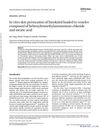Search
for
Sort by
Research
300-330 / 1000+ results
research Examining the Effect of Notocactus Ottonis Cold Vacuum Isolated Plant Cell Extract on Hair Growth in C57BL/6 Mice
Cactus extract from Notocactus ottonis may help promote hair growth.
research The Historical Studies Underpinning the Concept of Hair Follicle Neogenesis
Fibroblast growth factors are crucial for hair follicle development and regeneration.
research Adipose Mesenchymal Stromal Cell-Derived Exosomes Carrying MiR-122-5p Antagonize the Inhibitory Effect of Dihydrotestosterone on Hair Follicles by Targeting the TGF-β1/SMAD3 Signaling Pathway
ADSC-Exos with miR-122-5p can help treat hair loss by promoting hair growth.

research Proteomic Identification and Quantification of Secretory Proteins in Human Dermal Fibroblast-Conditioned Medium for Wound Repair and Hair Regeneration
The research found proteins in human skin cells that help with wound healing and hair growth, which could lead to new treatments.
research Skin Stem Cells, Their Niche, and Tissue Engineering Approach for Skin Regeneration
Skin stem cells are promising for healing wounds and skin regeneration due to their accessibility and regenerative abilities.

research Recombinant Human Growth Hormone Promotes Burn Wound Repair by Regulating Vascular Endothelial Growth Factor and Microvessel Density
Recombinant human growth hormone helps burn wounds heal faster by increasing blood vessel growth.

research Abstract 80
Different levels of shear stress affect where cells move and gather in a 3D-printed model, helping to better understand cell behavior in blood vessels.

research Anti-Cancer Properties of Olive Oil Secoiridoid Phenols: A Systematic Review of In Vivo Studies
Olive oil compounds may help prevent cancer in animals, but human results are mixed.

research Central Chorioretinopathy Associated with Topical Use of Minoxidil 2% for Treatment of Baldness
Using 2% minoxidil for baldness treatment might cause vision distortion due to fluid build-up under the retina.

research Brain-Derived Nerve Factor and Neurotrophins in Androgenetic Alopecia
Lower growth factors linked to balding in androgenetic alopecia.
research Comparative Characterization of Human Meibomian Glands, Free Sebaceous Glands, and Hair-Associated Sebaceous Glands Based on Biomarkers, Analysis of Secretion Composition, and Gland Morphology
Meibomian glands are highly specialized and differ significantly from other sebaceous glands in structure and function.

research Progress and Prospects: Gene Therapy for Performance and Appearance Enhancement
Gene therapy shows promise for enhancing physical traits but faces ethical, safety, and regulatory challenges.

research The Epithelial Stem Cell Niche in Skin
Skin's epithelial stem cells are crucial for repair and maintenance, and understanding them could improve treatments for skin problems.

research The Rotterdam Study: 2016 Objectives and Design Update
The Rotterdam Study found risk factors for elderly diseases, links between lifestyle and genetics with health conditions, and aimed to explore new areas like DNA methylation and sensory input effects on brain function.

research Generation of VEGF Knock-In Cashmere Goat via the CRISPR/Cas9 System
Scientists successfully edited a goat's genes to grow more and longer cashmere hair.

research The Use of Stem Cells in Plastic and Reconstructive Surgery
Stem cells could improve plastic surgery but are not widely used due to cost and safety concerns.
research Nano-Pulse Stimulation Therapy Is Superior to Cryoablation in Clearing Murine Melanoma Tumors
Nano-Pulse Stimulation™ Therapy is more effective and less damaging than cryoablation for treating melanoma tumors in mice.

research Scarless Wound Healing: Transitioning from Fetal Research to Regenerative Healing
Understanding how baby skin heals without scars could help develop treatments for adults to heal wounds without leaving scars.

research Prevalence of Polycystic Ovary Syndrome in Women in China: A Large Community-Based Study
PCOS is common among Chinese women of reproductive age and linked to serious metabolic and reproductive issues, especially in obese women.

research Increased DHT Levels in Androgenic Alopecia Selected to Protect Men from Prostate Cancer
Higher DHT in male baldness may protect against prostate cancer.

research In Vitro Skin Permeation of Hinokitiol Loaded in Vesicles Composed of Behenyltrimethylammonium Chloride and Stearic Acid
Vesicles made of behenyltrimethylammonium chloride and stearic acid can triple the skin absorption of hinokitiol, which may help with hair growth.

research The Facial Adipose Tissue: A Revision
Different types of facial fat affect aging and treatment outcomes; more research is needed to enhance anti-aging procedures.

research Platelet Preparations for Use in Facial Rejuvenation and Wound Healing: A Critical Review of Current Literature
Platelet preparations generally show positive effects on wound healing and facial rejuvenation, but more thorough research is needed to confirm their effectiveness.

research Transcriptional Profiling in Alopecia Areata Defines Immune and Cell Cycle Control Related Genes Within Disease-Specific Signatures
The study found that immune responses disrupt hair growth cycles, causing hair loss in alopecia areata.

research Inhibitors of 5α-Reductase in the Treatment of Benign Prostatic Hyperplasia
5α-reductase inhibitors and alpha-1 adrenergic antagonists together effectively treat benign prostatic hyperplasia, with long-term benefits.

research Experimental and Early Investigational Drugs for Androgenetic Alopecia
New hair loss treatments may include topical medications, injections, and improved transplant methods.

research Platelet-Rich Plasma Therapy for Male and Female Pattern Hair Loss
PRP therapy helps slow hair loss and increases hair thickness.

research The Roles of Wnt/β-Catenin Pathway in Tissue Development and Regenerative Medicine
The Wnt/β-catenin pathway is important for tissue development and has potential in regenerative medicine, but requires more research for therapeutic use.

research Immune-Related Alopecia (Areata and Universalis) in Cancer Patients Receiving Immune Checkpoint Inhibitors
Cancer patients treated with immune checkpoint inhibitors may develop alopecia, but some hair regrowth is possible with treatment.